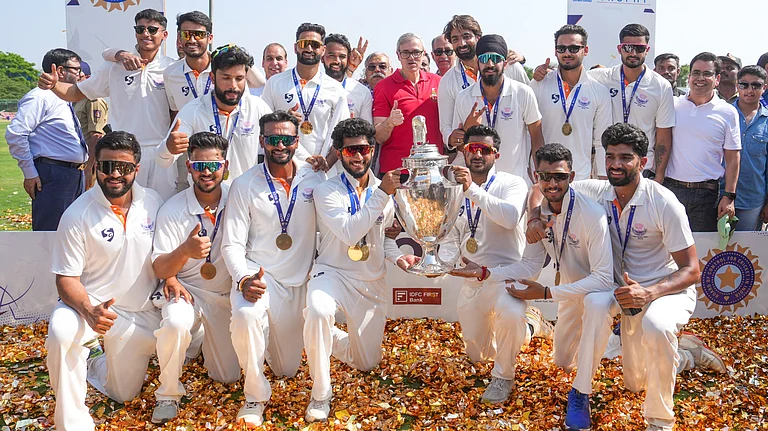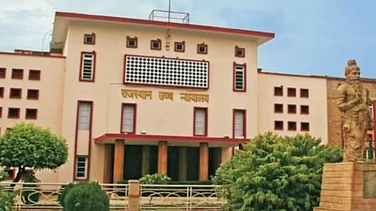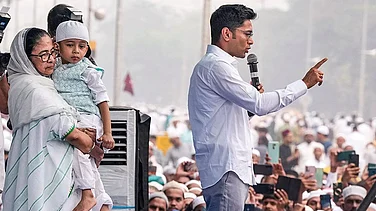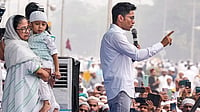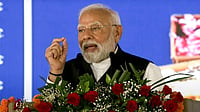With the India-China military face-off continuing in eastern Ladakh, Defence Minister Rajnath Singh on Tuesday said Indian troops are standing "firm" and the ongoing talks between the two sides for a peaceful resolution of the matter will continue as disengagement and de-escalation is the way forward.
Addressing top commanders of the Army, Singh reaffirmed the faith of the billion-plus citizens in the force as one of the "most trusted and inspiring" organisations in the country.
The Army commanders deliberated extensively on national security challenges along the borders with China and Pakistan and ways to boost the force's overall combat capability.
The defence minister, complimenting the Army leadership for successfully taking ahead the country's defence and security vision to new heights, said the role of the force is very important in nation-building.
In his remarks, Singh also lauded the Border Roads Organisation (BRO), saying its efforts have led to "quantum improvement" in road communication along the western and northern frontiers.
On the current situation along the northern borders, Singh expressed full confidence that while the troops are standing firm, the ongoing talks for peaceful resolution will continue and disengagement and de-escalation is the way forward, the defence ministry said in a statement.
The Indian and Chinese troops have been locked in a standoff at certain friction points in eastern Ladakh for nearly four years even as the two sides have completed disengagement from several areas following extensive diplomatic and military talks.
Referring to the situation along the borders with Pakistan, Singh complimented the Army's response to cross-border terrorism, adding that the proxy war by the adversary continues.
The defence minister complimented the "excellent synergy" between the Central Armed Police Forces, local police and Army in tackling the menace of terrorism in Jammu and Kashmir.
"The synergised operations in the Union Territory of Jammu and Kashmir are contributing to increased stability in the region and the same should continue," he said.
Singh lauded the forces for the high standard of operational preparedness and capabilities, which he said he has always experienced first-hand during his visits to forward areas.
Delving into the complex world situation, Singh said it affects everyone globally. "Unconventional and asymmetric warfare, including hybrid war, will be part of the future conventional wars. Cyber, information, communication, trade and finance have all become an inseparable part of future conflicts," he said.
"This necessitates that the armed forces will have to keep all these facets in consideration while planning and formulating strategies," the defence minister said.
He highlighted the stellar role played by the Army in guarding the country's borders and fighting terrorism, apart from providing assistance to the civil administration in every need of the hour.
"The Army is present in every domain, from security, HADR (humanitarian assistance and disaster relief), medical assistance to maintaining the stable internal situation in the country," he said.
"The role of the Indian Army is very important in nation building as also in the overall national development," he noted.
The defence minister complimented the leadership of the Army for successfully taking ahead the country's "defence and security" vision to new heights.
He also hailed the Army's approach on the infusion and absorption of cutting-edge technology.
Singh paid tributes to all bravehearts who made the ultimate sacrifice in the defence of the motherland.
The Army Commanders' Conference is an apex-level biannual event that is held in April and October every year. The conference is an institutional platform for conceptual-level deliberations, culminating in making important policy decisions for the Army.
The commanders comprehensively deliberated upon all aspects of the existing security scenarios, the situation along the borders and the hinterland and the challenges for the present security apparatus.
In addition, the conference also focused on issues related to organisational restructuring, logistics, administration, human resource management, modernisation through indigenisation, induction of niche technologies and the assessment of the impact of various existing global situations.
In his address, Singh appreciated the Army's efforts to develop niche technologies in collaboration with civil industries and thereby progressing towards the aim of 'modernisation through Indigenisation'.
"The nation is proud of its Army and the government is committed to facilitating the Army in their forward movement, on the road to reforms and capability modernisation," he said.
The defence minister emphasised that a regular interface of armed forces with emerging technologies is a must.
Singh concluded by saying that issues related to "defence diplomacy, indigenisation, information warfare, defence infrastructure and force modernisation should always be deliberated upon in such a forum."
Doctrinal changes whenever required should be made to make the armed forces future-ready, he said,
The recommendations and suggestions made by the senior leadership in forums such as the Commanders Conference should be deliberated upon and be taken to a logical conclusion with midcourse review and modification if required, he said.








